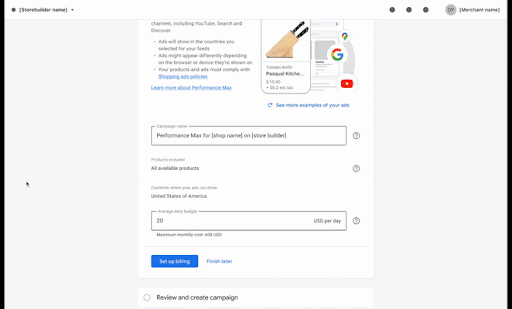4.3.1 直接结算方式
用户体验指南
要求用户设置结算信息的理想步骤是完成第一次广告系列设置之后(而不是在创建帐号之后立即执行)。如需了解详情,请参阅广告系列制作部分。这一步骤顺序 与大多数结账流程一致
结算设置无法使用 API 执行,即使您未选择重定向选项,也需要将商家重定向到 Google 界面。
如果您选择重定向选项来创建和管理广告系列,则系统会在 Merchant Center 中处理结算设置。请注意,在 Merchant Center 中设置结算信息时,商家可以使用信用卡付款。
如果您选择在应用内实现广告系列制作和管理,则结算设置将在 Google Ads 中进行处理。如需要求用户提供结算信息,建议在以对话框形式呈现的 Chrome 窗口中显示结算设置。由于用户仍会在后台看到集成的上下文,因此这种方法对用户的干扰最小。
管理付款方式部分概述了可以向商家提供的不同付款方式。下面的动画中显示了针对结算设置步骤的建议。

在商家输入其付款资料后,结算设置对话框还需要显示指向 Google Ads 条款及条件的链接。这是显示 Google Ads 条款及条件的最佳方式,因为它们根据可从付款资料中提取的国家/地区、语言和货币进行了调整。
技术指南
直接结算流程的运作方式如下:
获取
CreateCustomerClientResponse中返回的邀请链接,并将其呈现给商家。您可以对其进行设置,使得用户在点击链接后打开新的浏览器标签页(而不是替换当前标签页),以便商家可以返回您的平台。商家点击该链接,系统会在新的浏览器标签页中打开 Google Ads 邀请流程。
商家在 Google Ads 平台中设置结算信息,然后返回到您的平台以继续用户流。
您可以使用
BillingSetupStatus确认广告客户是否已完成结算设置。您还可以使用
CustomerUserAccessInvitationService的MutateCustomerUserAccessInvitation方法创建新的CustomerUserAccessInvitation,以发送电子邮件。请参阅更多详细信息。无需许可名单。电子邮件中的链接与CreateCustomerClientResponse中返回的链接相同,并且将在 20 天后过期。